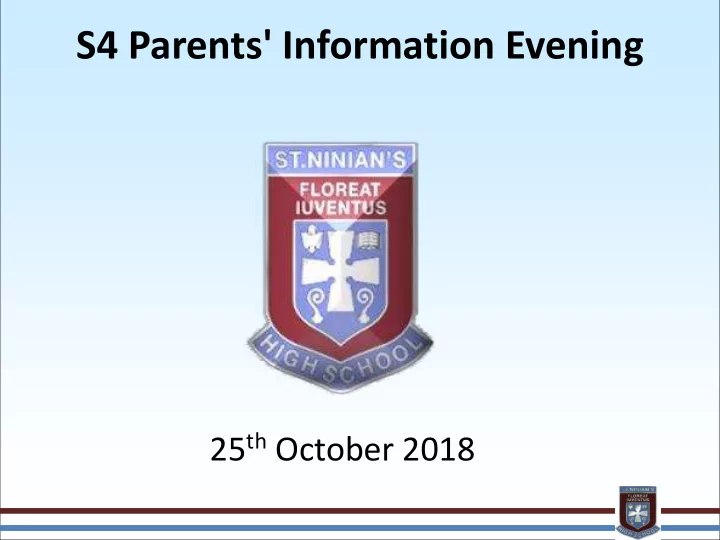

S4 Parents' Information Evening 25 th October 2018
Study Skills A very warm welcome to all! Our young people will fulfil their potential if provided with the right level of support, guidance and advice both at school and at home. This workshop aims to equip parents and caregivers with the necessary information to allow them to oversee and support their child as they prepare to sit exams for the first time.
Overview Study Timetables 5 Habits of an Effective Learner Advice to Parents from Parents Advice to Parents from Students Learn to Learn Useful Links
Study Timetables Planning ahead is extremely important. We recommend that pupils create and follow a study timetable in order to cover all the necessary work in a sensible and manageable way.
5 Habits of an Effective Learner The most important thing for us to understand is that there are numerous methods of study. What works for one individual won't necessarily work for someone else. Being aware of different strategies, trying them out, and finding what works best for your child will maximise the quality of their study and revision.
Retrieval Practice Two of the most common strategies used by students are reading over notes and highlighting key points. These are also two of the least effective strategies. Retrieval practice means testing yourself to see what you can remember from a particular unit or chapter. Regular practice builds stronger memory of the material in the long term.
Questioning and Elaboration This method involves asking questions and making connections between ideas and concepts. This can be done independently in written form or collaboratively as a discussion. Let's say you have learned some quotes from Macbeth : “Is this a dagger I see before me, The handle toward my hand...” You might then ask yourself the following questions:
Concrete Examples After learning the material, asking questions and establishing connections between ideas, one of the most effective things you can do is get concrete examples of abstract ideas you have learned in class. Study the best possible example of the thing you are trying to do, such as writing an essay. By evaluating an “A” graded essay (or “reverse engineering” it) you will begin to learn how to recreate it. Ask yourself:
Spaced Practice This is what we might call “cramming”. The material is quickly forgotten and the method usually causes stress. By breaking revision up into 30 minute chunks and spacing these out over a period of time, you will consolidate your learning and retain the material much more effectively.
Interleaving This method encourages you to mix up the topics within a subject rather than concentrating on only one at a time. Instead of doing this... ...try this! By mixing up or “interleaving” what you revise and when, you will remember that material far more effectively simply because you will have to revisit that material multiple times with more gaps in between.
Advice to Parents from Students Our S6 students are preparing for exams for the third time. We hope you find their feedback insightful.
Learn to Learn Each pupil in S4 has been provided with a copy of the textbook “Learn to Learn for Curriculum for Excellence”. This textbook outlines a number of practical strategies for retrieval and recall, and takes into consideration the many different learning and thinking styles of our young people. Please take the time to look over this with your child.
Useful Links BBC Bitesize SQA Website Scholar Glow St. Ninian's High School website
Recommend
More recommend